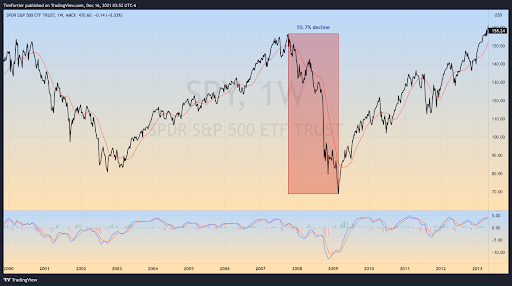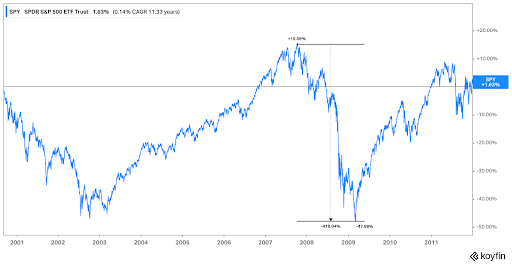Related Blogs
December 16, 2021 | Michael Reilly
Traditional investment advice asks that you buy and hold onto investments… often index funds.
Unfortunately, this approach is pretty inefficient in creating actual capital.
The data shows that investors spend the majority of their time simply treading water…
Or worse, riding through a market decline only waiting to get back to even.
The truth is that investors are only creating new capital less than 20% of the time!
That’s no way to grow your wealth over the long run.
The investment industry is performance-centric…
Almost every investor presentation, every piece of literature, and all investor attention is placed on performance.
But I am going to challenge you to ignore performance.
At least until you look at one other metric first…
Risk.
In my opinion, there’s nothing more important.
Understanding risk determines the quality of the journey and whether or not you’ll reach your financial destination.
We can define risk in several ways.
The first is through what is known as maximum drawdown (MDD%). MDD% defines how much an investment has declined from peak to trough during a market decline.
Let’s use the S&P 500 SPDR (SPY) as an example. Between the end of 2007 and 2009, the SPY lost a little more than 55% of its value.

For every $100,000 you had invested in “the market,” your account balance was taken down to $45,000.
Many investors would have bailed well before that.
There is something psychological that happens once losses start to exceed 20-30%. It becomes mentally challenging to stay the course.
While it’s easy to look at the past performance of the market and convince yourself that you would have stayed the course, remember this: You have the benefit of hindsight. You know how it turned out.
The next time it happens, you won’t have this benefit. And who is to say that the MDD% won’t be larger the next time?
The fact is, we don’t know. The future is unknown.
This point becomes even more important the older you get and the closer you are to big financial objectives such as retirement.
It’s critical to understand that losses are asymmetrical. What I mean by that is that it requires a greater return to recover from a loss than the amount of loss itself.
Let me demonstrate:
- A 20% loss requires a 25% return to get back to even.
- A 30% loss requires a 42.85% return to get back to even.
- A 50% loss requires a 100% return to back to even.
Recovery times from deep market corrections have varied historically… the 35% decline that investors saw during the Covid crash in 2020 was recovered in only six months – a record short time compared to past market corrections.
Past market declines have been less kind to investors.
- During the 1929-1932 market crash, the market lost 84% of its value and took 30 years to recover.
- Between 1966-1982 the stock market lost 72% of its value and took 29 years to recover.
- The 2000-2002 dot.com market crash caused a market loss of 37% that took 13 years to recover.
- Between the end of 2007 and 2009, the market lost 55% and it took nearly 6 years to recover.

Again, the point is we don’t know how things will play out in the future and it’s better to not get behind the eight ball in the first place.
So while return metrics are important, risk metrics provide detail to the other side of the same coin and can provide valuable information that can help determine your likelihood of long-term investment success.
If you’d like to talk a little more about your risk, and how we can help you know what to expect no matter how the market is turning, give us a call. We’re opening our doors to new investors who have portfolios valued over $500,000. If you’d like to schedule a free 1-hour consultation to review your portfolio and determine your risk score, click here.
Let’s talk soon,

Tags

Get Our FREE Guide
How to Find the Best Advisor for You
Learn how to choose an advisor that has your best interests in mind. You'll also be subscribed to ADAPT, Avalon’s free newsletter with updates on our strongest performing investment models and market insights from a responsible money management perspective.

